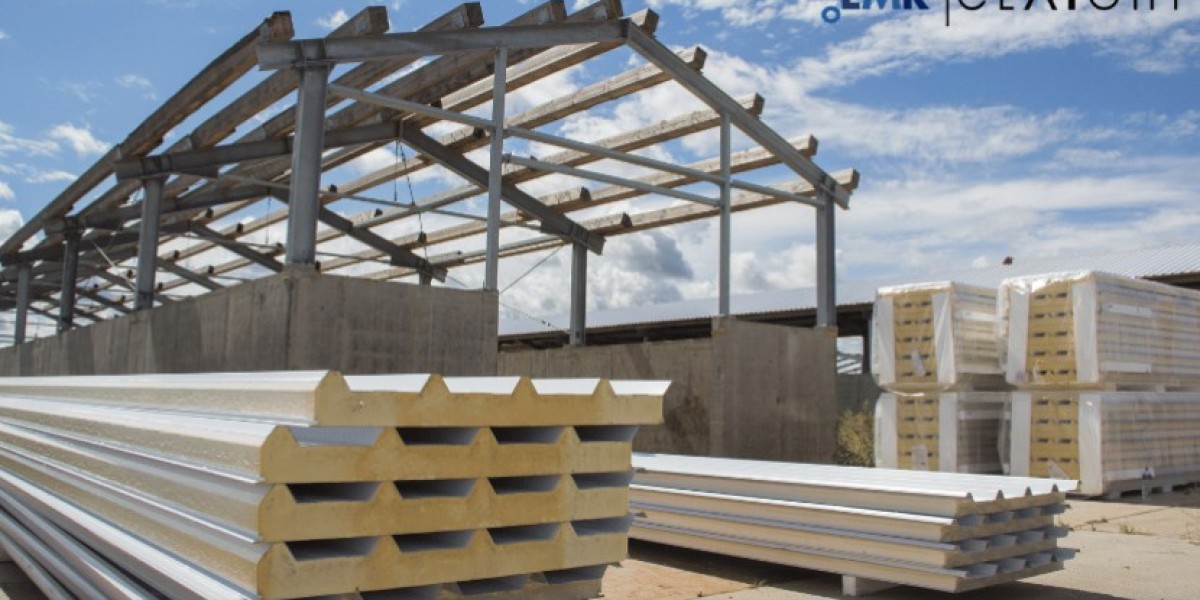The Guatemala construction materials market has seen significant growth, reaching a value of approximately USD 63.74 million in 2023. The market is projected to continue its upward trajectory, growing at a compound annual growth rate (CAGR) of 6.6% from 2024 to 2032. By 2032, the market is expected to reach a value of around USD 113.54 million. This growth is driven by a combination of factors, including increased government investment in infrastructure, technological advancements, and the growing demand for residential and commercial spaces.
Guatemala Construction Materials Market Outlook
In the fourth quarter of 2022, the construction sector in Guatemala made a substantial contribution to the country's GDP, amounting to $950 million. This growth reflects the sector's expanding role in the national economy. The Guatemalan government's ambitious infrastructure plans are set to further drive the demand for construction materials. By 2038, the government aims to expand the country's road network from 16,457 kilometers to 37,952 kilometers, necessitating a significant increase in the production and import of construction materials.
Guatemala's construction materials market also benefits from robust import activity. In 2021, the country imported over USD 1 billion worth of construction materials, a 40% increase from 2020. This surge in imports underscores the growing demand for construction materials, driven by both public and private sector projects.
Key Growth Drivers
The Guatemala construction materials market encompasses a wide range of products, including grouts, tile adhesives, mortar, concrete admixtures, and waterproofing solutions. Innovations in these materials are playing a crucial role in enhancing the strength, durability, and resilience of construction projects.
One of the most notable advancements is the use of nanomaterials in construction. Nanomaterials improve the characteristics of traditional materials, such as strength, durability, and thermal insulation. These innovations are fostering further growth within the construction materials market by providing more efficient and effective solutions for modern construction challenges.
Guatemala's construction sector has emerged as a key driver of economic growth. The sector's success is marked by substantial investments in infrastructure projects and residential developments, particularly high-density and single-family housing. The "Guatemala No Se Detiene" Plan, which focuses on transport infrastructure, includes 40 government-promoted development projects. This plan is expected to significantly boost the demand for construction materials in the coming years.
Key Trends and Developments
Several key trends are shaping the Guatemala construction materials market, including technological advancements, modular construction methods, the adoption of automation and digitalization, and a growing focus on sustainable development.
Technological Advancements
Advancements in construction materials are boosting the durability, energy efficiency, and safety of buildings. High-performance concrete, cutting-edge insulation materials, and smart building technologies are becoming increasingly popular in Guatemala's construction sector. These innovations are not only enhancing the quality of construction projects but also contributing to the overall growth of the construction materials market.
Modular Construction Methods
Modular construction methods are gaining popularity in Guatemala due to their cost-effectiveness and speed. This trend highlights the growing demand for lightweight, durable, and easily transportable construction materials. As modular construction becomes more prevalent, the demand for materials that meet these specific requirements is expected to rise.
Adoption of Automation and Digitalization
The integration of Building Information Modeling (BIM), robotics, and automation is revolutionizing the construction industry in Guatemala. These technologies streamline construction processes, enhance efficiency, and reduce labor costs. As a result, there is an increasing demand for construction materials that are compatible with these modern construction methods.
Sustainable Development
Environmental awareness and regulatory pressures are driving the demand for eco-friendly construction materials in Guatemala. Recycled materials, low-carbon concrete, and sustainable timber are among the products gaining traction in the market. The adoption of these materials is supported by energy efficiency regulations and green building standards, which are becoming more stringent in the country.
Market Segmentation
The Guatemala construction materials market is segmented by type and end use.
Market Breakup by Type
Tile Adhesives: Tile adhesives are designed for easy application and are crucial for ensuring the durability of tiled installations. These adhesives are formulated to adhere to various substrates commonly found in construction, such as concrete, cement render, plasterboard, and existing tiled surfaces. They are also engineered to withstand environmental elements like moisture, heat, and chemicals.
Grouts: Grouts are essential for filling gaps between tiles, ensuring a finished and durable surface. The demand for grouts is closely linked to the growth of the tile adhesive market.
Concrete Admixtures: Concrete admixtures are used to enhance the properties of concrete, such as its strength, workability, and durability. These admixtures are critical in large-scale infrastructure projects where concrete is a primary construction material.
Mortar: Mortar is used for bonding bricks, stones, and other masonry units. The growth of residential and commercial construction projects in Guatemala drives the demand for mortar.
Waterproofing Solutions: Waterproofing solutions are essential for protecting structures from water damage, especially in areas with challenging environmental conditions. The demand for these solutions is expected to grow as infrastructure development continues in Guatemala.
Market Breakup by End Use
Residential: The residential sector is a major consumer of construction materials in Guatemala. The expansion of residential construction, particularly in urban areas, drives the demand for materials such as cement, steel, and aggregates.
Commercial: The commercial sector is another significant driver of the construction materials market. The growth of commercial spaces, including shopping malls, office complexes, and mixed-use developments, increases the demand for construction materials. Foreign investment in the construction of hotels, resorts, factories, and logistics centers also contributes to this segment's growth.
Industrial: The industrial sector's demand for construction materials is driven by the development of factories, warehouses, and other industrial facilities. These projects require a wide range of materials, including concrete, steel, and insulation products.
Medical and Healthcare: The construction of hospitals, clinics, and other healthcare facilities contributes to the demand for specialized construction materials, such as those with antimicrobial properties or enhanced durability.
Others: This category includes infrastructure projects, public buildings, and educational institutions, all of which require significant amounts of construction materials.
Leading Manufacturers in the Guatemala Construction Materials Market
Several key players dominate the Guatemala construction materials market, offering a wide range of products and solutions for various sectors.
Sika Guatemala SA: Founded in 1910, Sika Guatemala is a symbol of excellence, innovation, and technological advancement in the construction industry across Central America. The company provides a comprehensive range of products, including waterproofing solutions, concrete admixtures, and specialty mortars.
Grupo Cemix: Established in 1978 and headquartered in Monterrey, Nuevo León, Grupo Cemix offers solutions for installing ceramic and marble tiles, maintaining and repairing concrete, and providing waterproofing solutions. The company has a strong presence in the Guatemala construction materials market.
Mapei S.p.A.: Founded in 1937 and headquartered in Milan, Italy, Mapei offers products for sports flooring, wood flooring, and structural strengthening. The company provides system solutions for various sectors, including hospitality, healthcare, and marine.
Protección Anticorrosiva de Cuautitlán, S.A. de C.V. (“PASA”): Established in 1985, PASA is based in Cuautitlán, Mexico. The company offers products for waterproofing, additives for concrete, and protective coatings, playing a vital role in the construction materials market.
Euclid - Guatemala S.A.: Euclid Chemical is a key player in the Guatemala construction materials market, offering a range of products, including concrete admixtures, epoxy coatings, and grouts.
Henkel AG & Co. KGaA: Henkel is a global leader in adhesives, sealants, and functional coatings, with a strong presence in the Guatemala construction materials market. The company provides solutions for various construction applications, including tiling, flooring, and waterproofing.
Mixto Listo: Mixto Listo is another prominent player in the Guatemala construction materials market, offering ready-mix concrete, aggregates, and other construction materials. The company is known for its high-quality products and reliable service.
The Guatemala construction materials market is poised for significant growth over the next decade, driven by robust infrastructure projects, technological advancements, and the increasing demand for residential and commercial spaces. As the market continues to evolve, key players will need to innovate and adapt to the changing landscape, focusing on sustainable development and the adoption of new materials and technologies. With the government's continued investment in infrastructure and the private sector's commitment to modernizing the construction industry, the future of the Guatemala construction materials market looks promising.






